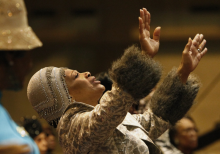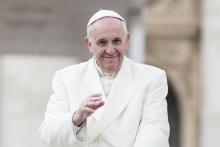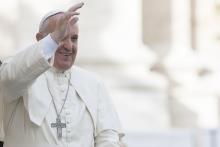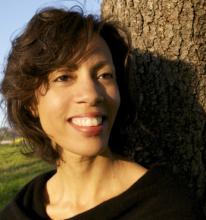Social Justice

“Historically, our church has done a wonderful job of preparing people for eternity, from a spiritual standpoint, but when our presiding bishop came into office he made the decision that we needed to focus even more on preparing people for living in this present world,” said Bishop Edwin Bass, in charge of the denomination’s urban initiatives program.
The initiative helps churches develop programs in five areas: access to quality education, economic development, crime prevention, strengthening families, and financial literacy.
“It’s a change from our normal business,” said Bass, a former marketing senior vice president for Blue Cross Blue Shield whose home congregation, the Empowered Church, is in Spanish Lake, Mo.
“The good news is a lot of our churches are on board.”
1. 9 Ways We Can Make Social Justice Movements Less Elitist and More Accessible
"After a few weeks of feeling confused and invisible, I decided that I just wasn't smart enough to be an activist."
2. WATCH: Obama Condemns 'Routine' of Mass Shootings, Says U.S. Has Become Numb
"As I said just a few months ago, and I said a few months before that, and I said each time we see one of these mass shootings, our thoughts and prayers are not enough."
3. French Catholics Take in Refugee Family Seeking a 'Normal Life'
"The local effort is part of a national Catholic network that connects homeless asylum seekers with families willing to take them in."

SINCE HIS ELECTION IN 2013, Pope Francis has been widely praised. But in this interview, conducted by Italian journalists Andrea Tornielli and Giacomo Galeazzi before the release of the encyclical “Laudato Si’,” Pope Francis speaks about the environment and economic justice; his perspectives on these topics have elicited harsh criticism from some.
How important is it for Christians to recover a sense of care for creation and sustainable development? And how do we ensure that this is not confused with a certain environmentalist ideology that considers humanity the real threat for the well-being of our planet?
Pope Francis: For the protection of creation we must overcome the culture of waste. Creation is the gift that God has given to humanity so it can be protected, cultivated, used for our livelihood, and handed over to future generations. The vocation to take care of someone or something is human, before being Christian, and affects all; we are called to care for creation, its beauty, and to respect all creatures of God and the environment in which we live. If we fail in this responsibility, if we do not take care of our brothers and sisters and of all creation, destruction will advance. Unfortunately, we must remember that every period of history has its own “Herods” who destroy, plot schemes of death, disfigure the face of man and woman, destroying creation.
But when humanity, instead of being custodian, considers itself to be the master, it ... moves toward destruction.

Christians do a disservice to the gospel message by removing the cultural context from Jesus’s ministry and watering down his message to one of religious platitudes. We like to generalize the words of Jesus and transform his life into a one-size-fits-all model that can apply to all of humanity.
Throughout the New Testament Jesus was more complex than we give him credit for.
He intentionally, purposefully, and passionately addressed very specific causes. He radically addressed the diverse and complicated conflicts of the time and shattered the status quo.
Jesus wasn’t just preaching a universal salvation message for the world, but he was also addressing specific political, social, and racial issues. He was helping those who were being abused, violated, and oppressed.

The work we do in the nonprofit sector is complex and multifaceted. Often we find ourselves compartmentalizing our identities based on the work we’re currently doing. Am I a woman, an organizer, an African American, a facilitator, a Roman Catholic, a philanthropist, or a manager? And which of those is most important to the success of my work?
The Summit, hosted by Sojourners, is a unique opportunity to rise above some of these identity markers and practice being as holistically authentic as we can. Over 300 leaders committed to changing the world through faith and justice gathered in June in Washington, D.C., for a three-and-a-half day exploration of the particular ways that faith leaders impact a range of social justice issues. NCRP facilitated a private conversation for nearly 2 dozen philanthropic leaders who attended The Summit to consider the role that philanthropy plays in this process.

IF YOU'RE A Christian who cares about social justice, you can’t afford to ignore Texas.
In his book Rough Country, Princeton sociologist Robert Wuthnow puts it bluntly: “Texas is America’s most powerful Bible-Belt state.” Texas has the second largest population in the country, home to more than 26 million people. In 2014, Texans led six out of 21 congressional committees. And more than half of Texans attend church at least twice monthly.
No other state has more evangelical Christians than Texas. Many national Christian media companies, parachurch ministries, and influential megachurches are based in Texas. That’s why Texas is called the Buckle of the Bible Belt: It’s the most populous, wealthy, and politically powerful part of the country where evangelical churchgoing is still a dominant force.
But what if we reimagine the Bible Belt? In 2005, Texas officially became a “majority-minority” state, where traditional minority racial or ethnic groups represent more than half of the population. A majority of Texans under 40 in the pews are people of color. This creates an opportunity: Demographic change could lead to cultural change. What if we cast a new vision for faith in Texas public life that puts working families and people of color at the center?
But demographic change will not translate automatically into cultural change. The dominant historical Bible Belt narrative has influenced and shaped the identities of all Texas Christians, including in the African-American and Latino faith communities.


The Rev. Martin Schlag is a trained economist as well as a Catholic moral theologian, and when he first read some of Pope Francis’ powerful critiques of the current free market system he had the same thought a lot of Americans did: “Just horrible.”
But at a meeting on May 11 at the Harvard Club, Schlag, an Austrian-born priest who teaches economics at an Opus Dei-run university in Rome, reassured a group of Catholics, many from the world of business and finance, that Francis’ views on capitalism aren’t actually as bad as he feared.

The Francis Revolution is crossing the Atlantic and coming to the heart of the nation’s Capitol. News broke yesterday that Pope Francis has accepted Speaker John Boehner’s invitation to address a rare joint session of Congress during his upcoming trip to the United States on Sept. 24.
This is the first time that a pope has addressed Congress and provides a world-class opportunity for the Holy Father to lift up the Gospel’s social justice message to the most powerful legislative body in the world.
So what will the Jesuit from Argentina talk about? Studying his nearly two-year tenure as the Bishop of Rome suggests that Pope Francis will focus particularly on the scandal of inequality and exclusion.
Last April, Pope Francis tweeted that “inequality is the root of all social evil.” The seven-word tweet caused an uproar in American media, but the truth is that Francis had been saying the same thing for years. In his 2013 letter Joy of the Gospel, Francis wrote “just as the commandment ‘Thou shalt not kill’ sets a clear limit in order to safeguard the value of human life, today we also have to say ‘thou shalt not’ to an economy of exclusion and inequality. Such an economy kills.”
With reports last fall suggesting that economic inequality in the United States is at its highest levels since the Great Depression, Pope Francis will likely call on our elected leaders to transform our economy into one where no one is left behind.

Eugene Cho is overrated.
At least that’s what he’ll tell you in his new book, Overrated: Are We More in Love with the Idea of Changing the World Than Actually Changing the World?
Cho, pastor at Quest Church in Seattleand founder of One Day’s Wages and Q Café, is an outspoken Christian voice for social justice. His first book is a self-professed confession of the risks of personal platform in the work of justice — and a call to humble self-awareness for Christians in an age of social change-idealism. When justice and changemaking are buzzwords, how do we embrace the long challenge of bettering the world while remaining humble about our place in it?
Watch the interview below.

Absolutely, say organizers of a first-of-its-kind conference to be held by atheists of color in Los Angeles this weekend. And, they add, it’s about time those issues got some attention.
Called “Moving Social Justice,” the conference will tackle topics beyond the usual atheist conference fare of confronting religious believers and promoting science education. Instead, organizers hope to examine issues of special interest to nonwhite atheists, especially the ills rooted in economic and social inequality.
“Atheism is not a monolithic, monochromatic movement,” said Sikivu Hutchinson, an atheist activist, author and founder of Los Angeles’ Black Skeptics, one member of a coalition of black atheist and humanist groups staging the conference.
“By addressing issues that are culturally and politically relevant to communities of color, we are addressing a range of things that are not typically addressed within the mainstream atheist movement.”
The conference is unusual for an atheist gathering in another important way — its lineup of speakers includes members of the religious community. Hutchinson, often an outspoken critic of religion, described the conference as “effectively an interfaith conference.”

Over the years, I’ve been given by some the mini-reputation as a leader in the field of justice. At first, I took it as a compliment and of course, I still do because I care a lot about justice. I know that people mean well. But I care about justice not just for the sake of justice. I care about justice … because I care much about the Gospel.
And sometimes, when I hear folks talk about justice in the church, I cringe …
I cringe because if we’re not careful, we’re again compartmentalizing justice rather than seeing it as part of the whole Gospel; We need to see justice as a critical part of God’s character and thus, our discipleship and worship.
Just like we shouldn’t extract the character of “love” or “grace” or “holiness” from God’s character, such must be the case with justice.
People often ask me, “What’s the most critical part about seeking justice?”
My answer:
We must not just seek justice but live justly. Justice work and just living are part of our discipleship. Justice contributes to our worship of God. Justice is worship.

It was the beauty on the outside that drew me away.
Before social justice became trendy among evangelicals, people of all denominations, faiths, and philosophies had already been steadily working in the trenches without fanfare, caring for the least of these with a quiet strength.
Through seminary, I learned to grapple with justice being at the heart of the Christian Gospel — dignity, equality, and right to life for all — I marched out into the real world with zeal and vigor to champion the rights of the oppressed in the name of Jesus. However, I discovered the people who were doing this work often had no identification with Christianity, that those outside of church were behaving more Christian-ly than some inside.
I admired Nicholas Kristof, a self proclaimed nonreligious reporter, who tirelessly sheds light on humanitarian concerns.
I adored Malala, a Muslim, who stood up to the Taliban to bravely demand a right to education for girls.
I reflected on the justice heroes of recent history, people like Gandhi and countless other humanitarian workers who don’t claim the Christian faith for their own.
It disoriented me because for so long I believed it was only through Christ that one can walk in righteous paths; that without the Truth (which had been so narrowly summed up for me in John 3:16), everything was meaningless. I didn’t have an interpretive lens to categorize beauty that existed outside of the vessel I was told contained the only beauty to be found: the evangelical Christian church.


In July 2010 I joined with around 100 freedom fighters in Chicago, many of whom had traded the previous year of their lives to fight for comprehensive immigration reform. And we knew it was not going to happen in 2010, at least as we had imagined. Many in the room were exhausted, and defeated, and spent. The response from the campaign was to talk about the next hill to climb rather than deal with the pain and exhaustion in the room.
Doing justice is hard and exhausting work. We are compelled to action by the urgency of the suffering and pain and evil that mark life for so many in God’s world. And the work is never done. Win or lose, there is always another hill, another peak, another challenge that lies ahead. So the temptation is to keep on keeping on, and to rise to the next challenge.
For the past 20 years, I have either been a pastor or a community organizer, and for many of those years I have been both. For pastors and organizers, there is always one more email to write, one more call to make, and one more strategy to be explored. To be blunt, burnout and exhaustion are the order of the day.

The concept of social entrepreneurship, which can be defined as the use of entrepreneurial and innovation principles to promote social change, is not new. It’s been rebranded with a trendy name, but the concept of developing new ways to solve social problems has existed for ages as a key mechanism to promoting social justice. So why aren’t more Christians prominent in today’s social entrepreneurship movement?



